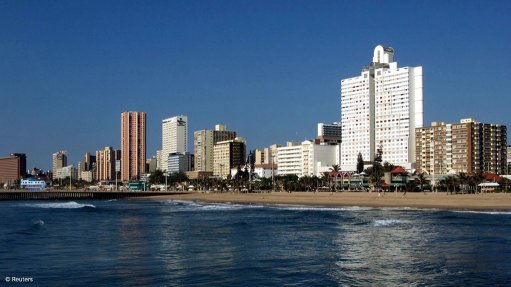
POWER SUPPLY FOR WATERThe eThekwini municipality in Durban has already brought two mini hydroschemes on its existing infrastructure to the tender stage
Photo by: Reuters
The Renewable Energy and Energy Efficiency Partnership (Reeep) in its ninth call for proposals has finalised two of the 28 projects aimed at scaling up renewable energy and energy efficient solutions in key emerging markets and selected developing countries in Africa and Asia. Two of these are located in South Africa. The first project is a feasibility study that will focus on identifying small-scale hydropower potential powering water supply in Kwa-Zulu-Natal by building small hydropower plants on existing infrastructure. The second project is an investigative study that will assist municipalities in providing sustainable electricity at municipal level for various municipalities. The eThekwini municipality, in KwaZulu-Natal, has already brought two mini hydroschemes on its existing infrastructure to the tender-bidding stage, but the municipality is faced with challenges to fund the development of other mini hydro-opportunities.
Therefore, the first Reeep project will assess hydropower potential on the existing water supply infrastructure and consider issues involving load centres, power generation potential, sustainability and networks, as well as technical and construction issues.
It will further identify priority sites where containerised small hydrotechnology can be deployed and training for eThekwini staff and its partners can be provided.
The total generation capacity needed to power the water supply infrastructure of eThekwini is about 2 MW and the feasibility study will establish a clear process for implementing the new small hydropower installations.
The feasibility study will be complete in 2014 and the budget is €246 500, with €148 000 being funded by the Reeep grant provided by Norway and Switzerland. Entura Hydro Tasmania and eThekwini Water and Sanitation will provide the remaining €98 000.
The second project is an investigative study for the provision of sustainable electricity at municipal level in South Africa. It will foster the development of business strategies with city electricity departments that will ensure tariffs to enable cities to provide services, while optimising the roll-out of small-scale photovoltaic (PV) systems that are consistent with government priorities.
The study will review relevant national policies and plans and local-level energy and climate change strategies to ensure project activities are in line with them. It will also entail the development of a spreadsheet-based model of the electricity-load profile and revenue implication for the City of Cape Town and the metros of eThekwini and Ekurhuleni.
Further, the study will facilitate the uptake of small-scale solar PV to improve the cities’ ability to feed into the national energy planning processes and assist munici- palities in delivering electricity solutions to poor households.
The budget for the study is €172 180, with €148 180 to be provided by Norway in the form of a Reeep grant. The remaining €24 000 will be provided by the Evangelische Entwicklungsdienst, the City of Cape Town, eThekwini Metro and the South Africa Local Government Association.
The 28 projects were selected from 98 final proposals in five thematic areas – scaling up successful business models, supporting off-grid generation, harnessing the benefits of clean energy in food production and reliable water supply and supporting the provision of more energy data in emerging markets.
Reeep’s focus includes, for the first time, Peru and Vietnam, mostly because of Swiss funding. Switzerland is contributing to 14 projects that will stimulate market development.
The government of Norway, a strong supporter of Reeep since 2006, is supporting or cofunding 15 of the projects.